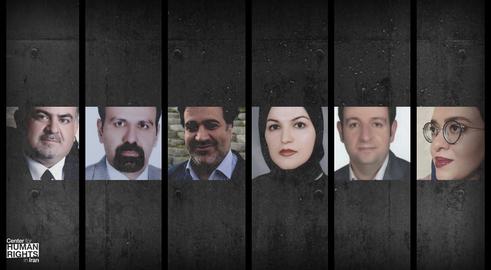Iran's new Chief Justice Gholamhossein Mohseni Ejei has urged Iranians currently living abroad to come back home, even suggesting that they will return to a warm welcome if they do.
This echoed comments made by Ebrahim Raisi, Iran’s new president, during his own time as chief justice. Raisi had spoken of “laying the groundwork” for the repatriation of Iranians.
Try telling that to Kianoosh Sanjari, a journalist and human rights activist.
“I returned to my beloved country Iran on a one-way permit. But very soon my dreams faded away, when, instead of welcoming me, they threw me in jail and tortured me,” he said in response to the recent comments by the new head of the judiciary.
On June 22, Sanjari also responded to Raisi, tweeting: “Yes! I too returned to my country over the course of this ‘laying the groundwork’. I was threatened, humiliated and tortured inside a soundproof room at Ward 209 and in safe houses. They sat me in front of the camera so that I would give false testimony against myself.”
A Wave of Optimism that Led to Despair
In 2016, Sanjari returned to Iran after several years of working with Persian-language media abroad. He was arrested and sentenced to 11 years in prison. “Without a doubt, going to Iran, my return to my beloved country, was a total mistake,” Sanjari told Voice of America.
In the United States, he said, he was a political refugee, but when his mother fell sick he decided to had to come back. “Emotionally I was shattered. I just wanted to do something to make it less painful. All I can say is that in those days my logic succumbed to my emotions. I wanted to be brave and optimistic, so I deceived myself. I told myself the conditions and the people in Iran had changed...I thought the problem would be solved with a simple conversation and not with prison and torture. But the reality was much, much harsher and rougher than I could have imagined.”
Sanjari left Iran in 2006 after security forces arrested him several times. The optimism he referred to in his Voice of America interview somehow made him ignore the fact that, before leaving, he had spent a total of two years — between the ages of 17 and 24 — in jail.
One reason for his excessive optimism, he says, was that during his years in exile Islamic Republic officials had consistently attended events and gatherings organized by Iranians abroad, where they talked to them and even invited them to return home.
For 10 years, Sanjari says, he longed to return to Iran. “When I arrived in Tehran I was in an extraordinarily beautiful mood. I remember this image: the plane was flying from Qatar and crossing over the Persian Gulf. When the plane entered Iran my heart went wild. My tears were flowing. It was a feeling that I have no way of describing. You have to feel it yourself.”
But just a few days after arriving in Tehran, he was arrested by intelligence ministry agents and taken to Ward 209 at Evin Prison. He was interrogated and after a trial that lasted only minutes, Branch 26 of the Revolutionary Court sentenced him to 11 years in prison. He would have to serve a minimum of five years. He was also banned from leaving Iran for two years after serving his sentence.
In early 2019, after serving three years of his sentence, Sanjari fell sick and the prison doctor ruled that he must be granted a medical leave of absence. Instead, he was quickly transferred to Aminabad Psychiatric Hospital. “One day they handcuffed me, put me in a car and transferred me, under guard, to Aminabad, also known as Razi, Psychiatric Hospital. They took me directly to the ward and two soldiers stood guard over me. At night the nurse injected me with something that for all intents and purposes locked my jaw. I fell unconscious after the injection and, in the morning when I woke up, I saw that my hands and feet were chained to the bed.” He describes this moment as the “most painful” of his life.
A week later and prompted by his mother following up on him, Sanjari was returned to Evin Prison and, after a few months, was designated as eligible for medical furlough.
Electric Shocks and Branded Insane
But it did not end there. By order of the Special Medical Committee, Sanjari was hospitalized several more times. He reported that during one of these hospitalizations, he was subjected to electric shocks nine times.
He is currently on medical furlough, but is required to regularly present himself at Evin Prison, reporting to the office responsible for monitoring people convicted or charged with security offences.
After Sanjari’s comment directed at the incoming president, Sanjari’s Twitter account was blocked. According to Maryam Karimbaigi, the sister of Mostafa Karimbaigi, who was killed in the protests following the disputed 2009 presidential election, before being blocked, Sanjari received the following tweet : “It seems you are again missing the asylum! Signed: anonymous.”
But there is much evidence that Sanjari’s experience is not unique. To this day dozens of prisoners of conscience have been sent to Aminabad Psychiatric Hospital in a continuing effort to label them as insane. Journalist Hengameh Shahidi, political activist Farzin Rezaei Roshan and poet Mina Rad are among them, as was Gonabadi dervish Behnam Mahjoubi, who died in custody. He fell into a coma and died after being transferred from prison to the hospital. His wife said he had been denied medication. Officials depicted Mahjoubi, like the others, as “going insane”. But a short look over his last days and months suggests that description was a tactic to divert the public from the truth: that he had been brutally treated by security forces and, later, by prison personnel.
Related Coverage:
Iran’s New Chief Justice Mohseni Ejei Linked to Murder of Journalist
Chief Justice Mohseni Ejei Signals an Even Bleaker Future for Human Rights
How is Mohseni Ejei Different to Other Chief Justices of Iran?
Mohseni Ejei's Record of Prisoner Deaths
Supreme Leader of Iran Labeled “Press Freedom Predator”
Visualizing Censorship in Iran: A Live Data Project on Persecuted Journalists
Assistant Prosecutor is Accused of Killing Dervish Prisoner
Security Agencies' New Project: Certifying Dissidents Insane
Electric Shocks and Injections Lead to Death and Disabilities in Iranian Prisons
Haloperidol: Antipsychotic Medication Used Frequently in Iranian Prisons
visit the accountability section
In this section of Iran Wire, you can contact the officials and launch your campaign for various problems

























comments